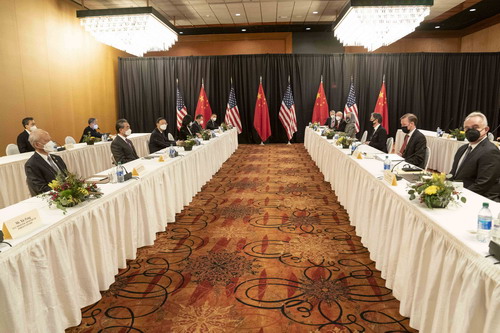Below is an excellent piece from The Atlantic about the recent US-China high-level meeting in Anchorage, which may come to be seen as the moment the US, and its allies, began to deal effectively with Xi Jinping’s regime.
…

The original is here.
The U.S. and China Finally Get Real With Each Other
The exchange in Alaska may have seemed like a debacle, but it was actually a necessary step to a more stable relationship between the two countries.
MARCH 21, 2021
Senior fellow at the Brookings Institution
Thursday night’s very public dustup between United States and Chinese officials in Anchorage, Alaska, during the Biden administration’s first official meeting with China, may have seemed like a debacle, but the exchange was actually a necessary step to a more stable relationship between the two countries.
In his brief opening remarks before the press, Secretary of State Antony Blinken said that he and National Security Adviser Jake Sullivan would discuss “our deep concerns with actions by China, including in Xinjiang, Hong Kong, Taiwan, cyber attacks on the United States, and economic coercion toward our allies. Each of these actions threaten the rules-based order that maintains global stability. That’s why they’re not merely internal matters and why we feel an obligation to raise these issues here today.”
Blinken’s comments seemed to catch the Chinese off guard. The last Strategic & Economic Dialogue of the Obama administration, in 2016, began with a conciliatory message from then–Secretary of State John Kerry and resulted in a declaration identifying 120 different areas of cooperation.
In response to Blinken, China’s top diplomat, Yang Jiechi, said that because Blinken had “delivered some quite different opening remarks, mine will be slightly different as well.” He spoke for 16 minutes, blowing through the two-minute limit agreed upon in torturous pre-meeting negotiations over protocol. “Many people within the United States,” he said, “actually have little confidence in the democracy of the United States.” He went on to say that “China has made steady progress in human rights, and the fact is that there are many problems within the United States regarding human rights.” He also took aim at U.S. foreign policy: “I think the problem is that the United States has exercised long-arm jurisdiction and suppression and overstretched the national security through the use of force or financial hegemony, and this has created obstacles for normal trade activities, and the United States has also been persuading some countries to launch attacks on China.”
As the press began to leave, assuming that the opening remarks were over and to make way for the private discussions, Blinken and Sullivan ushered them back in and challenged Yang, telling him that “it’s never a good bet to bet against America.” Determined to have the last word, Yang and China’s foreign minister, Wang Yi, responded again. Yang began by saying, sarcastically, “Well, it was my bad. When I entered this room, I should have reminded the U.S. side of paying attention to its tone in our respective opening remarks, but I didn’t.”
The opening exchange did not appear to materially affect the rest of the meeting. A senior administration official told me that the moment the cameras left, the Chinese side went back to business as usual, working through the list of issues on the agenda, including nonproliferation and Iran. The official told me that the U.S. delegation believed Yang’s opening gambit had been preplanned and was not an off-the-cuff response. The Chinese delegation had come, the official said, with the intention of delivering a public message, which they did in dramatic fashion. China believes that the balance of power has shifted in its favor over the past 10 years, especially during the pandemic, and wanted to play to the audience at home.
For an astonished press, witnessing the exchange was like being present at the dawn of a new cold war and seemed to sum up just how bad the U.S.-China relationship had become. Writing in The New York Times, Ian Johnson warned, “These harsh exchanges will only contribute to the dangerous decay in relations between the world’s two most powerful countries. Both sides seem to be trapped by a need to look and sound tough.”
But this view misunderstands what is needed in U.S.-China diplomacy right now. The meeting would have been a failure if it had resulted in general declarations to cooperate while minimizing competition, a common U.S. strategy when China’s intentions were not as clear. Organizing the relationship around cooperation is theoretically desirable as an end goal but will be unattainable for the foreseeable future, given the unfolding reality of an assertive, repressive China and a defiant America.
Last year, as it anticipated a win for Joe Biden in the U.S. election and then during the transition, China signaled that it wanted to effectively reset the relationship regarding cooperation on climate change and the pandemic. The Biden team saw these overtures for what they were: a trap to get the U.S. to pull back from competing with China in exchange for cooperation that would never really materialize. Biden officials told me that any reset would have been rhetorical only; China would have continued to push forward on all other fronts, including its quest for technological supremacy, its economic coercion of Australia, and its pressure on Taiwan.
Had the Biden administration embraced China’s offer, any agreement would have collapsed beneath the weight of Beijing’s actual behavior, as well as opposition in Washington. Biden would have been forced to adjust course and take a more competitive approach anyway, under less favorable conditions, including nervous allies and an emboldened China.
By skipping this step in favor of a strategy of competitive engagement—meeting with China but seeing it through the lens of competition—the Biden team not only saved time, but it flushed Beijing’s true intentions out into the open for the world to see. In his remarks, contrasting “Chinese-style democracy,” as he called it, with “U.S.-style democracy,” Yang implicitly acknowledged that the U.S.-China relationship is, and will continue to be, defined by a competition between different government systems: authoritarianism and liberal democracy.
The Biden administration understands that a more assertive U.S. approach is jarring to many in the American foreign-policy establishment, which is accustomed to decades of cautious and cooperative engagement in high-level meetings. But friction is necessary, given China’s play for dominance over the past several years. “It is increasingly difficult to argue that we don’t know what China wants,” said the senior administration official, who asked for anonymity so as to speak freely about the meeting. “They are playing for keeps.”
Biden’s priority rightly seems to be creating a greater common cause with allies against China, especially on technology and economics. Sullivan refers to this approach as building a situation of strength, echoing the famous formulation by Truman’s secretary of state Dean Acheson, who made clear that strengthening the Western alliance was a necessary precondition for any talks with the Soviet Union. The U.S. has had considerable success with the Quad, the informal strategic alliance among the United States, Japan, Australia, and India, although the U.S. needs to be far more imaginative and ambitious in getting European nations on board with its efforts to compete with China.
The question after Anchorage is what role should bilateral diplomacy with Beijing play in America’s overall strategy to deal with China. Now that the dramatic public exchange has set a more honest approach for a competitive era, the two sides can progress to a much harder next phase.
The rules-based international order is over. Beijing and Moscow concluded long ago that a world in which China and Russia generally acquiesced to U.S. leadership, as they did in the 1990s and 2000s, was untenable, a Western trap designed, in part, to undermine authoritarianism. They were not entirely wrong about that—many Americans saw globalization and multilateralism as having the desirable side effect of encouraging political liberalization around the world.
The truth is that the United States does pose a threat to the Chinese Communist Party’s interests (although not necessarily those of the Chinese people), while the CCP surely poses a threat to liberal democracy and U.S. interests. Ultimately, Washington and Beijing will have to acknowledge this to each other. That will be difficult for the Biden administration, which is accustomed to assuming that American interests are not a threat to any other government, but broadly benefit all major world powers. It will be even harder for Beijing, which goes to great lengths to conceal its revisionism behind a shield of insincere platitudes.
Such an acknowledgment will allow a truly frank strategic conversation to occur about how these two countries’ systems will relate to each other as they compete. These systems are incompatible in many respects, but they are also intertwined in a myriad of ways. The goals of U.S.-China diplomacy should initially be modest, to avoid unintentional provocations and to facilitate transactional cooperation on shared interests. Eventually, if China’s behavior and the geopolitical conditions are favorable, the two sides could explore broader cooperation and even the possibility of a détente—a general thawing of tensions—but that is a long way off.
Historically, the most volatile periods of rivalry between major powers is in the early stages; think of the late 1940s and the 1950s in the Cold War. The red lines become apparent only through interactions in crises. The greatest risk is for either side to miscalculate the resolve or intentions of the other. By getting real in Anchorage, both sides have taken the important first step toward a more stable relationship by acknowledging the true nature of their relationship.
THOMAS WRIGHT is a contributing writer at The Atlantic, a senior fellow at the Brookings Institution, and the author of All Measures Short of War: The Contest for the 21st Century and the Future of American Power.







